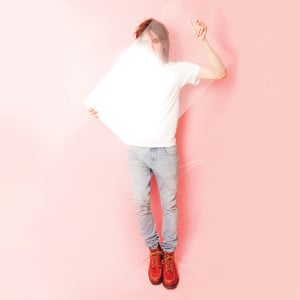Luke Rathborne started his music career in a small town in Northern Maine, where he organized DIY punk shows as a teenager. When a wanderer who was staying with his family left his guitar behind, he picked up the instrument and never looked back. At the tender age of 18, he left his childhood home for New York City with the dream of making it as a musician in the big city. Seven years, two EPs and countless shows later, Rathborne is releasing Soft, a “sarcastically upbeat” album that juxtaposes a pop aesthetic with undertones of existential angst. With honest songwriting and heartfelt lyrics, he creates a connection with the listener that transcends the superficial interactions of the popular culture machine. As he prepares for an important tour and brews up a soft drink to promote his new album, Rathborne continues his relentless search for unique ways to engage his audience.
“FIGHT TO WIN THEM OVER”
With the momentum of two critically acclaimed EPs (Dog Years and I Can Be One) carrying him forward, Rathborne is poised to make another big push this fall. September brings the release of his second full-length album Soft and an East Coast tour supporting the influential Scottish rock group Travis. The tour will be his biggest yet, and performing to Travis’ well-established fan base is a golden opportunity for Rathborne to expand his audience.
Whether he’s preparing for an important tour or a studio session, Rathborne has a simple philosophy: play live shows. A lot of them.
 “We’ll book about three shows a week in New York and you can do that because there’s so many places to play here. You promote some of them but some of them you show up to and just play. Sometimes it’s just good to get into a room of people who don’t know who you are and you have to fight to win them over.”
“We’ll book about three shows a week in New York and you can do that because there’s so many places to play here. You promote some of them but some of them you show up to and just play. Sometimes it’s just good to get into a room of people who don’t know who you are and you have to fight to win them over.”
He continues, “And then, when you get on tour, you’re ready because it’s so much better to go into a room that’s that big and full of people and you’re so much more appreciative and excited. I think that has to do a lot with playing well, with playing a good show. You have a respect for the audience and you have a relationship with them.”
CONNECTING WITH THE CROWD
Rathborne is no stranger to playing big shows. When he opened for the Strokes at SXSW in 2011, he performed to a crowd of over 30,000 in an Austin park filled beyond capacity. Experiences like these can make some musicians jaded, but Rathborne is more passionate than ever about connecting with an audience, even if it’s just 10 people in a bar.
This connection can be visceral and instantaneous or subtle and lingering. His voice fills with excitement when he talks about the band Suicide and front man Alan Vega, who would venture out into the crowd during performances, walking on tables and kicking over people’s drinks.
“I love that story of Alan Vega, because you can imagine someone in the audience saying to themselves ‘that was crazy!’ If that were happening now I would want to go see it. Because it’s not just a gimmick, it’s a real relationship that he’s having with the audience.”
Though Rathborne doesn’t always interact with the audience so flamboyantly, he always finds a way to leave them with something to take home. He’s well aware of the fact that private experiences, that might happen long after the show ends, are sometimes the most important.
“It’s cool to leave an impression. But it’s not like that scene in a movie where they’re holding a guy up after he just won the game or something. It’s a bit more subtle then that, what people look for. It’s something that exists in the person when they leave that is unique and one of a kind. Something that might only hit you two days or two weeks later.”
PEELING AWAY THE FACADE
For Rathborne, creating these intimate relationships with an audience is about more than just selling music or furthering his career. It’s about sharing an artistic experience that is so often absent from commercial music and popular culture. While major labels and television networks crank out music and musicians that are safe, marketable, and familiar, Rathborne uses his music to strip away the veneer of idealized perfection that commercialism throws over real life.
“We live in an era that is dominated by commercialism. We’re constantly being marketed to and it’s sort of out of our control because it’s being decided by other people and it’s being decided by money. I think that, historically, money hasn’t always been the purveyor of good taste or interesting concepts.”
He concludes, “Our generation is experiencing a new time where we’re so connected on so many levels and yet there’s this definite feeling of disconnection. We’re the pioneers of going through whatever that is.”
THE SOFT DRINK
Rathborne is acutely aware of how his frustration with commercialism conflicts with the need to promote his own music. The physical distribution method he created for his new Soft LP elegantly sums up this contradiction. Instead of making CDs Luke is creating a soda to sell to his fans. This Soft drink will have a code on the label that fans can use to download a digital copy of the album.
“I don’t know where [the idea] came from. I was looking at Andy Warhol stuff and thinking about pop music and pop art and shit like that. There’s like this branding and commercialism to everything and I thought it would be fun to just embrace that by saying, ‘Here’s this shitty soda which actually has music on the back and it has tons of caffeine and taurine in it and it’s bad for you, but it has music in it.’”
With his Soft drink in hand, Rathborne is blazing a trail into the future of physical music distribution. As it becomes easier and easier for fans to access data through the Internet, digital music will inevitably shed the crude, flimsy physical form of the CD. Still, music lovers will always crave something they can touch, and the physical form of digital music will never disappear, only change shape. Crucially, Rathborne makes this physical product into its own artistic statement. More than just a vehicle of music distribution, Rathborne’s Soft drink complements the music, but also stands on its own as an intriguing piece of visual art.
Most importantly, the Soft drink is yet another way for him to create a lasting connection with his audience. During Rathborne’s September tour, the Soft drink pun will attract a fan to the merch table. It might only be two days or two weeks later, in a private moment, that they reflect on how Soft and the drink are a commentary on commercialism and the alienation of modern life. In Rathborne’s words, “Don’t you think we need that out of artwork? We don’t need to constantly be fed.”
photos by Brea Souders
